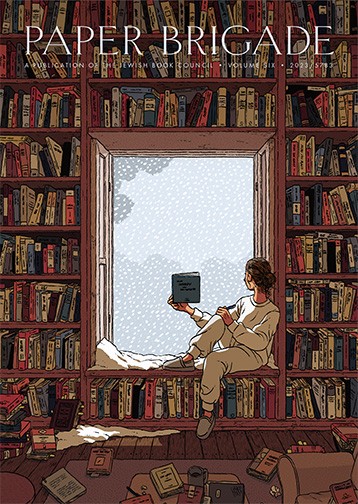
Paper Brigade Volume Six
Featuring interviews with Michael W. Twitty, Sloane Crosley, Gary Shteyngart, and Claire Stanford; a Jewish literary map of India; five YA authors on mythological Jewish creatures; and more.
At checkout, you will be given the option to add an electronic gift note to this order.
The Joy of Shmutz
Felicia Berliner
My Family’s Grinding Stone
Esther David
A Bengali Play in the Warsaw Ghetto
Jai Chakrabarti
How to Have a Disagreement Without Having a Fight
S. Bear Bergman
Saul Freedman-Lawson
How Materials Speak
GennaRose Nethercott
Mothers and Others
Melissa R. Klapper
Struggling Our Way Toward Collective Narration
Sam Cohen
Seven Years with Stella
Michael Frank
<p>Furthermore<br /><strong>Miron C. Izakson, translated by Joseph Faust</strong></p>
<p>Michael W. Twitty, Alyson Richman, and Shaunna J. Edwards<br /><strong>Laura Arnold Leibman</strong></p>
<p>Gary Shteyngart and Claire Stanford<br /><strong>Stephanie Butnick</strong></p>
<p>Emi Watanabe Cohen, Sacha Lamb, Rebecca Podos, Aden Polydoros, and Gavriel Savit
<p>Sloane Crosley<br /><strong>Becca Kantor</strong></p>
<p>Candles for Artemisia<br /><strong>Elisheva Fox</strong></p>
<p>The Imminent Decline of Everything We’ve Understood To Be What Governs Our Privileged Daily Lives<br /><strong>Daniel Khalastchi</strong></p>
<p>Christmas Day<br /><strong>Julia Kolchinsky Dasbach</strong></p>
The Virgin Grandmother
Kate Schmier
Poland Itinerary, Class 3B
Leeor Ohayon
<p>Jewish Book Council’s Literary Map of India<br /><strong>Katherine Messenger</strong></p>
<p>Sephardi Voices<br /><strong>Henry Green and Richard Stursberg</strong></p>
<p>Violins and Hope<br /><strong>Daniel Levin</strong></p>
To Our Readers
Programs & Publications
Index of Book Reviews
2022 – 2023 Network Authors
JBC Network Communities
2021 National Jewish BookAwards
Natan Notable Books
Note from the Editor
Often, the way we tell a story is as important as the story itself.
In our polarized world, this is on the minds of many Paper Brigade contributors. Some examine how narratives can — intentionally or not — preclude others. In a short story by Leeor Ohayon, Ashkenormative retellings of history exclude the Mizrahi protagonist by placing the Holocaust at the center of Jewish identity. In a conversation with Gary Shteyngart, Claire Stanford observes that this kind of binary storytelling is only reinforced by apps and online platforms that push us toward a “simplified categorization” of our lives.
So how do we create a space for individuals’ stories to coexist as part of a larger Jewish narrative? For Sam Cohen, this comes down to a linguistic shift — “the melting of the I into the we” — that lets people transcend different opinions and come together as a “motley collective.” Felicia Berliner also describes language as a tool for honoring both personal and group identity. Combining Yiddish and English allows the protagonist of her novel to reconcile her Hasidic upbringing and the secular world she discovers online.
Other writers remind us that Jewish stories can be enhanced by a “language that goes beyond words,” as GennaRose Nethercott notes. For her, this language is puppetry; for orphans in the Warsaw Ghetto, as Jai Chakrabarti explains, it was acting in a Bengali play that projected “a sense of hope and possibility.” And some stories can be passed down without any verbal communication at all. Michael W. Twitty, Shaunna J. Edwards, and Alyson Richman explore how sewing and cooking are repositories of Black and Jewish history.
Of course, as still other writers and artists in this issue point out, narrating is only one half of storytelling. The other half is listening. Our hope is that, by binding disparate stories into the “motley collective” you hold in your hands, the multifaceted whole of today’s Jewish literary voices will be heard.
—Becca Kantor, Editorial Director